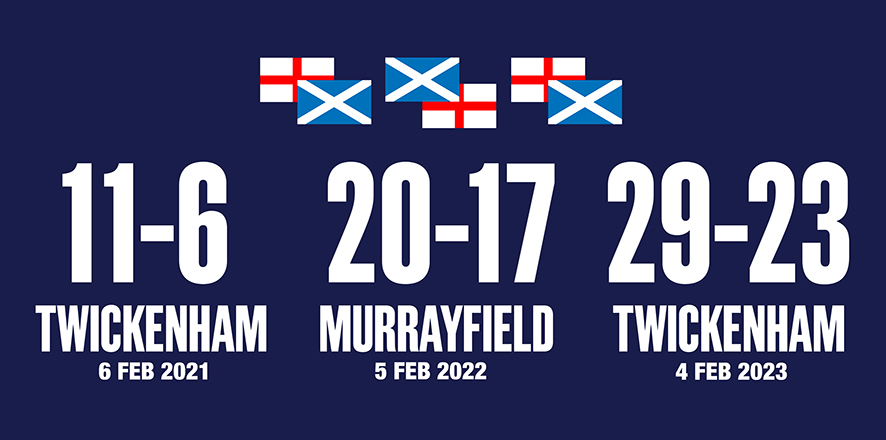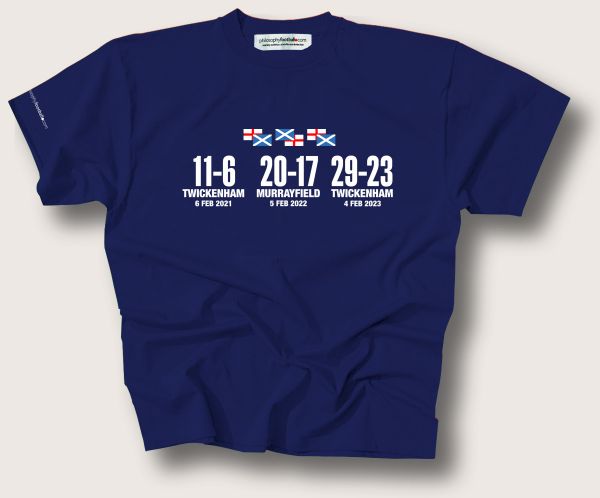
Scotland, England and Ninety-minute nationalism
11.02.23
Philosophy Football's Mark Perryman explores how an idea endures after the final whistle

Or in the case of last Saturday's Scotland 29 England 23 'eighty minute nationalism' but doesn't alliterate as well as the original coined by Jim Sillars. In an earlier version of surging Scottish National Party (SNP) support former Labour MP Jim having joined the SNP in 1988 sensationally won the Govan by-election overturning a 19,509 Labour majority. Four years later Labour won it back.
On the global football pitch this era was pretty much as good as it gets for the Tartan Army. Qualifying for every World Cup 1974-1990, the first time to make it even sweeter for the Scots, minus England too. But beyond the touchline compared to now the SNP was very much a minor party, in that 1992 General Election Jim lost his seat the SNP returned just 3 MPs, the same dismal result as five years earlier in the 1987 Election.
How different to today. 'Eighty-minute nationalism'?More like 24/7. Afer the 2019 General Election across Scotland the SNP boast 48 MPs , almost all gained at Labour's expense, Labour itself down from 41 in Scotland as recently as 2010 to an unprecedented low of just one. Scotland's SNP First Minister Nicola Sturgeon absolutely dominating Scotland's political landscape, the SNP the governing party in Scottish Parliament as it has been since 2007.
And the rugby team, if not the football team, can put England to the sword, or should that be the claymore? Of course, this isn't to suggest every Scottish rugby fan cheering on their team, or football fan likewise, is a diehard Scottish nationalist but there is a political context to a Scotland victory at England's self-styled 'home of rugby'. Or to misappropriate the famous CLR James dictum on cricket ' What do they know of rugby who only Rugby knows'.
Scotland began their three-in-a-row winning streak of Calcutta Cup victories over England, their first such sequence since 1972 to loudly spoil Twickenham's 150th anniversary marking of the very first rugby international, Scotland vs England. In September Scotland play England at Hampden, because of last year's World Cup delayed a year, to mark the 150th anniversary of football's first international, Scotland versus England. On the pitch ours has never been a United Kingdom, a Greater England masquerading as Great Britain. Rather, three nations sharing one small island. Off the pitch in Scotland this nationhood is expressed via a hugely popular civic, broadly social-democratic, nationalist politics. In Wales via an increasingly independently-minded Welsh Labour Party who thanks to such positioning haven't suffered the same catastrophic declined as unionist Scottish Labour, alongside the Welsh nationalist Plaid Cymru, like the SNP civic nationalists, broadly social democratic.
But what of England? Twickenham, Wembley full of St George Cross flags every time England play. Lords, Oval, Old Trafford (cricket), Headingley and Edgbaston likewise for The Ashes this summer. And for a World Cup or Euros St Georhe is flown, worn, daubed on faces up and down the country too, but not much else when it comes to any sort of public expression of what England means. There is no nation the historian Eric Hobsbawm's observation applies more to than England: "The imagined community of millions seems more real as a team of eleven named people." Or indeed, fifteen.
When the Scotland and England rugby teams lined up for the pre-match ceremonies there is something unique about England's participation. While every other team in the world we play gets to sing their own National Anthem, England doesn't have any such thing. God Save the King the anthem of the United Kingdom but not England's to call our own. And thar United Kingdom? Scotland dropped it to adopt Flower of Scotland, Wales Land of our or Hen Wlad Fy Nhadau. What is it about the English we cannot be ourselves, subjects never citizens, in a country, unlike our team, we can call our own. Or as this so-called National Anthem rather neatly puts it ' Long to reign over us, happy and glorious'. Not exactly a vision for the new Jerusalem is it?
Perhaps part of the explanation lies in where Scotland beat England, Twickenham, headquarters of The Rugby Football Union (RFU). Unlike every national rugby union in the world there's a word missing, the country where the sport is being governed. And it's the same with Wembley, headquarters to The Football Association (FA), spot what's missing? The assumption some century and a half down the line from those first internationals is that the one true 'home' of these sports is here, England, and never mind the rest of the world. The result? Via this make-believe process we render ourselves incapable of understanding what Engand was, is, might yet become.
Further Reading Mark Perryman Breaking Up Britain : Four Nations after a Union

Scotland Calcutta Hat-Trick T-shirt Limited edition available from Philosophy Football here
Mark Perryman is the co-founder of the self-styled 'sporting outfitters of intellectual distinction' aka Philosophy Football